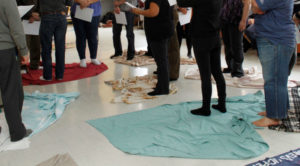Like this article? rabble is reader-supported journalism. Chip in to keep stories like these coming.
Despite the parallels between the history of colonization in North, Central and South America, if you ask Latin American expats what they know about Canada’s Truth and Reconciliation Commission and Indian Residential Schools, most will answer “not much.”
In an effort to build greater awareness in this community, the KAIROS Blanket Exercise was translated into Spanish, with help from Miguel Pickard, a long time KAIROS partner who lives in Mexico.
The KAIROS Blanket Exercise is a participatory activity that tells Canada’s 500-year history from an Indigenous perspective. It is extremely powerful. When KAIROS first presented the Spanish version in March at the North Park Presbyterian congregation in Toronto, the participants quickly identified their shared history of oppression and the loss of Indigenous cultural identity, language and traditions.
The participants, mostly women, experienced guilt and shame for not knowing the history of the Indigenous people in the land they now call home. They also felt guilty for not knowing enough about their own Indigenous identity and history, and for not questioning what in their hearts they know isn’t right.
Unfortunately, this lack of questioning is common. Too many of us don’t ask why the first inhabitants of Turtle Island live in unacceptable levels of poverty and why so many communities lack access to safe drinking water.
Participants were shocked to learn that in the 1800s some Indigenous peoples were deliberately given blankets infected with diseases. During the talking circle that follows the exercise, some said “it was hard to believe” that for 130 years Indigenous children were taken from their parents and placed in Indian Residential Schools far away from their homes and communities with the intent to “take the Indian out of the child.”
One participant offered a public apology to the group for failing to recognize that oppression and racism are at the root of issues such as poverty and alcoholism, which affect Indigenous peoples on and off reserve.
Others spoke of how learning the history of Indigenous peoples in Canada made them think of their own history in former Spanish colonies. They realized that they too had been colonized to the point that they deny their own Indigenous roots and know little about their Indigenous culture and traditions.
Participants reflected that in Latin America, racism and discrimination against Indigenous peoples is so prevalent and profound that many people call someone ‘Indian’ to offend them.
Everyone agreed that the KAIROS Blanket Exercise opened many conversations about how to increase meaningful relationships of solidarity between Indigenous peoples and Diaspora communities in Canada. There is a desire in the group to learn more and to establish friendships with Indigenous sisters and brothers.
I am preparing to facilitate the Spanish KAIROS Blanket Exercise at the World Social Forum in Montreal. Thousands will descend on the city from August 9 to 14 including people from Latin American countries. The Spanish KAIROS Blanket Exercise takes place Wednesday, August 10 from 1:00 – 3:30 p.m. at Cégep du Vieux Montréal (Local 860), 255, Rue Ontario E.
You are welcome to join us!! Quedan todos y todas invitadas!
To learn more visit: kairoscanada.org/kairos-world-social-forum
Or contact Alfredo Barahona: [email protected]
To learn more about the KAIROS Blanket Exercise visit: kairosblanketexercise.org
Alfredo Barahona is KAIROS Canada’s Indigenous, Migrant & Network Relations Coordinator.
Like this article? rabble is reader-supported journalism. Chip in to keep stories like these coming.



